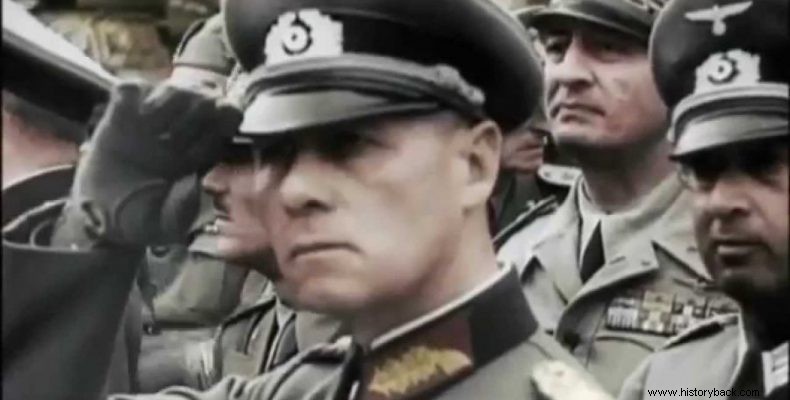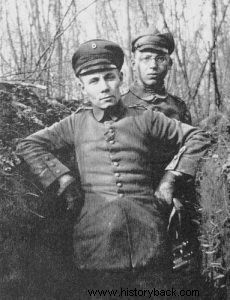
Erwin Rommel, on July 10, 1910, joined the 124th Württemberg Infantry Regiment as a probationary officer. According to the then current system, the future officers were classified as cadets in the various regiments and after a useful service of about two years, they were called officers.
So did Rommel after a year, he was sent first to the military academy in Danzig, and then, in January 1912, he was made a second lieutenant of infantry, passing the examination with a rank barely above the base. Even so, Rommel eventually became an officer and was assigned to the 7th Company of the 2nd Battalion of the 124th Infantry Regiment.
On the morning of August 22, 1914, Rommel followed the movement of the 2nd Battalion towards the village of Blade. The battalion had been ordered to occupy Hill 325, which was about 2.5 km NE of Blade. Rommel was ordered to move with his platoon, as the vanguard of the battalion and investigate for the presence of enemies in the village. Rommel's company was marching in dense fog, which limited visibility to 50 meters.
Rommel managed to orient himself with the help of a map and a compass. He reached hill 325 and moved beyond it towards the Blade. The 2nd Battalion established itself defensively on the hill. To the west of the hill the German security units came into contact with the enemy and exchanged fire with him. The firing gradually stopped.
In this skirmish the Germans suffered no casualties. They even took a prisoner. Suddenly their captain ordered a change of front obliquely to the left. The platoons were ordered to deploy their men in a strafing formation. Rommel's platoon formed the extreme left of the company, keeping in touch with the right of the 1st Battalion.
Deployed for battle, the platoon moved towards the village, through a potato field. The tracks of the enemies were visible in the soft soil, but they were still "invisible" due to the dense fog. Suddenly a thunderclap tore through the air. The Germans fell prostrate on the ground. Rommel was in the front line, among his men, armed with the rifle and bayonet of Private Hanle, his orderly.
He tried to make out the enemies, but it was impossible due to the fog. But he directed his men towards the glare of the enemy rifles. But the French caught up with him and retreated. The platoon continued its movement towards the village, despite the fact that it came under fire again.
The worst thing was that because of the fog, contact with the 1st Battalion was lost. Rommel nevertheless continued to move forward. His platoon had moved about 800 yards when it encountered a tall thicket next to a farmhouse. Unable to make out anything, Rommel decided to deploy the platoon defensively along the green. He also sent a detachment to make contact with the 1st Battalion.
He along with Sergeant Ostertag and two men moved ahead of the platoon to survey the ground. Walking slowly and carefully they came across other farmhouses. It was located on the SE side of the village. They moved along a road, but froze when they saw 20 French soldiers standing in the middle of the road.
The French were drinking coffee and chatting carelessly, weapons in hand. These were, as Rommel would later find out, men of the 5th Company of the 101st French Infantry Regiment. Fortunately, the French did not see them. Rommel moved behind a farmhouse. There he decided to attack the French by surprise, with his three men. He didn't have time to alert the rest of the platoon.
After all, he would have to move again in front of the enemies, who this time might see him. So he made the bold decision to engage the five-fold enemies. Slowly and as quietly as they could the four Germans disengaged, moved behind the French and suddenly opened fire. The French, taken by surprise, fled, leaving behind some dead and wounded.
But soon, apparently "weighing" the volume of fire from the Germans, they took positions behind the battlements and the large centuries-old trees and responded to the German fire. Rommel himself was involved in a "duel" with a Frenchman, from which he eventually emerged victorious.
Nevertheless, the French were greatly outnumbered and Rommel with his three men was forced to retreat and take refuge behind the bushes where the rest of the platoon had also taken refuge. From there, only 70 meters away from the enemy, Rommel with amazing composure stood and began to scan the ground with his binoculars. He spotted some Frenchmen firing at them from a roof. Observing more closely he saw that the enemies had fortified themselves in a large house. He immediately decided to take possession of it.
He ordered his platoon's 2nd squad to open fire on the French, drawing their attention. At the same time, he himself, head of the 1st group, would move from the right of the building, in order to approach it unseen and capture it by assault. Fortunately for them, they also discovered some piles of cut trees.
Rommel's men took one of the logs with the intention of using it as a battering ram. When everything was ready Rommel ordered the 2nd group to open fire. The French immediately responded with vigor. At the same time, however, the 1st group arrived, without being noticed, at the front door of the building. A few thumps of the trunk and the door had crashed to the ground.
Immediately the Germans rushed into the building with loud shouts, pointing their spears. Other soldiers threw lighted torches through the broken windows. Soon the building was engulfed in flames. Those French who had survived surrendered. With morale boosted, as they had not even suffered any casualties, Rommel and his men began to clear the village houses one by one in the same way.
But then, due to the dense fog, parts of the 2nd Battalion, as well as the 1st Battalion, deviated and entered the village together. Confusion ensued as the units got mixed up. The result of the confusion was to find an opportunity for the French to regroup. Soon the Germans began to receive heavy fire and suffer significant losses. It was Rommel's first contact with the reality of war.
The seriously wounded were carried behind a house to a makeshift outdoor dressing station. Many of them were screaming in pain, crying. Others, as he writes, faced death head on, like heroes. But soon the turn of the battle forced him to recover his cynical mask.
The French had managed to control the south and north-west parts of the village. The Germans had essentially found themselves in the middle of the village, almost surrounded, with the buildings behind them on fire. If they remained in their positions they would all meet death, either quickly, by a Lebel's fireball, or horribly, by the ravenous flames.
Rommel, according to his favorite habit, took the initiative and gathered around him as many soldiers as he could see, in the thick fog and smoke of the fire. He ordered the men to pick up the wounded and retreated from the burning Blade.
After they reached a safe place, a few hundred meters from the village, he gathered as many worthy men as he could find - about 100 - and deployed them facing the village. He himself took the leaders of his platoon and moved towards a hill from where he could look down on the village. To their right was hill 325.
Rommel was trying to distinguish with the binoculars the movements of the opponents. But the smoke and fog didn't help. Suddenly Rommel saw in front of him a French company taking up defensive positions, near the location where he had deployed his men. having lost all contact with both his company and battalion, Rommel hesitated for a moment as to what he should do.
From the firing he could hear he knew that his battalion, or at least part of it, must still remain attached to the Blade. The French company could cut off the retreat of the battalion. So it had to be neutralized. Rommel immediately moved the men from the low neck where he had lined them up and moved against the French company.
As soon as the French saw them, they immediately opened fire on them, but without effect. Their fire was too high – apparently due to a misadjustment of the inclinoscope – and did not harm the Germans. As Rommel typically states:"the only result was a hole in a caravan"! At the same time, Rommel perceived German troops, about a kilometer behind them, advancing in their direction.
Having secured "reinforcements", Rommel decided to attack the enemies immediately. The Germans, moving successively in groups, approached the French positions within assault distance. But the French noticed them and retreated immediately, leaving behind only their dead.
Rommel ordered the men to occupy the enemy positions and organize in them, and he and the squad leaders moved forward again, into the tall cobs. Suddenly Sergeant Bendele tripped Rommel. He had seen the French. Sunlight had been reflected on a caravan that a French soldier had tied to his horse. a whole French company marched upon them in a phalanx in fours.
Rommel without thinking too much stood up, hidden in the tall ears of corn, raised the rifle he was carrying and fired. At such a short distance he knew that a volley from his Mauser could pierce even three Frenchmen together. The French phalanx stopped for a moment.
But soon he moved again. Then Rommel and his sergeants charged again and the French fled. The three Germans, disheartened, began to shoot standing and completely uncovered at the retreating enemies. The French did not even stop to fire.
Some others of them who were running in panic outside the Blade, although they got within 10 meters of the Germans, they didn't manage to shoot! They were all killed by Rommel and his two NCOs. A total of 12 Frenchmen were killed or wounded by the three Germans, who alone put 30 times as many opponents to flight.
Soon the first elements of the German 123rd Grenadier Regiment arrived on the battlefield. Immediately Rommel left them the responsibility of occupying the field and with his platoon moved forward in pursuit of the French. In this phase the platoon captured 50 French prisoners, among them two officers. It was Rommel's first battle and first victory.

